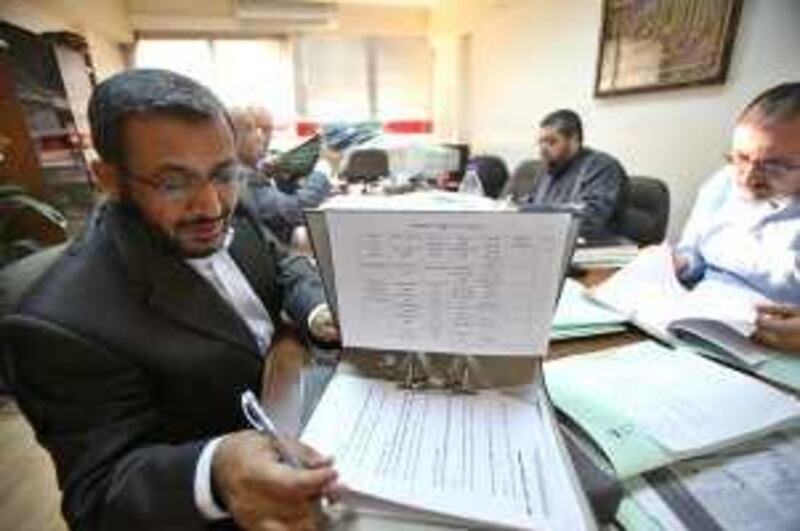AMMAN// Jordanian engineers will probably not participate in a regional engineering conference scheduled in Jerusalem next month if the only way to get there is by obtaining a visa from the Israeli Embassy in Amman.
Their decision is part of a growing movement against normalisation of ties between Israel and Jordan. Jordan's 14 professional associations typically bar their 170,000 members from having any dealings with Israel based on a decision taken by their general assemblies a few months after Jordan and Israel signed a peace treaty in 1994. The associations, dominated by leftists and Islamists, have been leading an anti-normalisation campaign that would stigmatise those who deal with Israel.
Under Jordanian laws, professionals must belong to an association to work officially. As Jordan and Israel mark 15 years of peace on October 26, the anti-normalisation camp is trying to strengthen its base. "The associations are in a state of alert. We want to organise an Arab conference by the end of this year or early next year in one of the Arab countries to come up with a unified Arab stance against normalisation," Badi Rafayaa, the head of the professional associations' anti-normalisation committee, said.
"We are trying to strengthen our work against normalisation and spread its culture. It is our only weapon - There are countries who are against normalisation that are showing responsive gestures to it." His statements indicate anti-Israeli sentiment is still running high in Jordan, particularly since Israeli soldiers broke into Jerusalem's Al Aqsa mosque last week. They also come as the United States has been trying to persuade moderate Arab countries to convey friendly gestures of normalisation to Israel in return for a freeze on settlements, in the hope that such a measure would jump-start bilateral and regional peace talks.
Meanwhile, a debate has been brewing over how to define normalisation. For example, the anti-normalisation committee labelled a rare visit by several Jordanian journalists to Jerusalem last month as normalisation even though the journalists went to write about Jordan's role in preserving Muslim heritage sites in the city. Under the peace treaty with Israel, Jordan remains the official custodian of the holy sites in east Jerusalem.
For the Jordanian professional associations, the definition of normalisation includes "any thought, saying, optional work or any action that leads to eliminating the state of animosity with the Zionist occupation directly or indirectly, acceptance of the status quo - that would give legitimacy to the enemy". "When it comes to officials, we overlook their visits and dealings with the Zionists because they have no choice, but nobody forced journalists to go to Jerusalem," Mr Rafayaa said.
The Jordan Press Association said in a statement that journalists were doing official work to affirm the Arab identity of Jerusalem and to stress the role of Jordan in preserving the Islamic religious sites there. The journalists' names, however, will be published in a report by the anti-normalisation committee this year under normalisation activities, in the hope that people would boycott them, Mr Rafayaa said.
The associations have also urged Jordanians this summer to refrain from joining religious tours to Jerusalem because that would involve receiving an Israeli visa on their passports. Although the anti-normalisation camp claims it represents the voice of the majority, not everybody is pleased with it, not because Jordanians are keen to normalise with Israel, but because they feel that the anti-normalisation committee has become judge and prosecutor and gone beyond its mandate.
"I don't know exactly when and how the word 'normalisation' came to signify visiting occupied Palestinian land or dealing with Palestinians," wrote Nermeen Murad, a columnist with The Jordan Times last month. "Even if the price of maintaining that interaction and consolidating Arab presence in the West Bank does mean that we allow Israeli stamps on our passport, it is a small price to pay in return for lifting the isolation imposed on Palestinians by their occupier and now, it seems, perpetuated by, I believe, the well-meaning anti-normalisation camp in Jordan."
Although ties between Jordan and Israel are cool and there are continued calls to expel the Israeli ambassador from Jordan, the government uses its ties to support the Palestinians. A Jordanian field military hospital was set up in Gaza this year after the Israeli onslaught. "There needs to be a clear distinction between helping our Palestinian brothers and between those who conduct business with Israel for their own interest. Helping the Palestinians under siege, even if it has to be through dealing with Israeli, is not normalisation," said Adnan Hayajneh, a professor of political science at Hashemite University in Zarqa, Jordan.
"Taking care of our religious site is not normalisation. But forgetting about the past and the Palestinians rights is normalisation." smaayeh@thenational.ae





